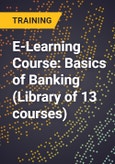Learning Objective:
Understand the financial system
Know principles governing banking
Understand various functions in banking
Understand operational framework for best practices in banking
Target Audience:
Those who are interested in understanding the basics of banking.
Course Content
1. Indian Financial System - An OverviewOn completion of this course you will be familiar with:
The meaning of the term 'Financial System
The evolution of the structure and constituents of the Indian Financial System
The role of financial system in the country
The constituents of financial system
The recommendations of Narasimham Committee on the financial system
2. Introduction to Banking
On completion of this course you will be familiar with:
Meaning and definitions of Banking/ Bank under different systems.
Main universal principles of banking
Main types/ groups of banks under Indian banking system
Traditional and modern functions of banks
Trends in Indian banking
3. Banking Regulation
On completion of this course you will be familiar with:
Constitution and objectives of RBI
Functions of RBI as the regulator of the Indian banking system
Monetary tools of RBI and effect thereof on banks
Priority sector advances - their composition and rationale
Regulations on bank lending
4. Banker Customer Relationship
On completion of this course you will be familiar with:
Definition of 'customer'
Different forms of banker-customer relationships
Banker's duties
Banker's rights
Redressal of the customers' grievances and the Banking Ombudsman Scheme
Termination of banker-customer relationship
5. Types of Customers and Their Accounts
On completion of this course you will be familiar with:
The essential generic requirements to be complied with, while opening a deposit account.
The various types of domestic customers and their special requirements to be complied with, while opening their accounts.
Non-resident accounts and their special requirements to be complied with.
6. Deposit Accounts
On completion of this course you will be familiar with:
The importance of deposits for the bank, its customers and the economy
Various categories of deposits, types of deposit accounts and their main features
Common principles and precautions involved in opening, closing and operating the deposit accounts
7. Negotiable Instruments and Related Matters
On completion of this course you will be familiar with:
Negotiable Instruments -Meaning, features and kinds of negotiable instruments
Other Instruments- Banker's drafts, traveler's cheques
Crossing and endorsements
Holder / payment in due course
8. Loans and Advances
On completion of this course you will be familiar with:
Importance of lending
Main kinds of fund-based and non-fund based credit facilities
Non Performing Assets - classification, management and measures to minimize
9. Fee-based Banking Services
On completion of this course you will be familiar with:
Varieties of funds remittance/ transfer by demand drafts, mail/ electronic transfer, and collection of bills/ cheques
Types of Letters of Credit and guarantees issued by banksAgency services like government business, sale of insurance/ Mutual Fund products securities
Safe custody of valuables and safe deposit lockers
10. Electronic Banking
On completion of this course you will be familiar with:
Impact of information and telecommunication technologies on banking
Automated Teller Machines (ATMs)
Tele-banking
Internet Banking
Mobile Banking
Electronic Funds Transfer
Electronic clearing system
11. Basics of Accounting
On completion of this course you will be familiar with:
The accounting concepts and standards
The systems and methods of accounting
The rules of double entry book-keeping
The main kinds of books of accounts
The meaning and composition of balance sheet and profit & loss statement
12. Basics of Bank Marketing
On completion of this course you will be familiar with:
Functions of Bank Marketing
Marketing mix
Services Marketing mix
13. Know Your Customer
On completion of this course you will be familiar with:
Initiatives of RBI
KYC policy - origin
RBI's approach and objectives
Guidelines on KYC








